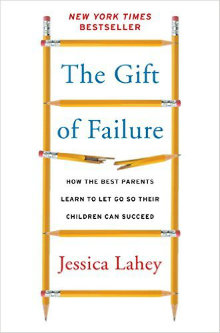The Gift of Failure Can Lead to Success
The Gift of Failure: How the Best Parents Learn to Let Go So Their Children Can Succeed
By Jessica Lahey
(Harper, 2015 – Learn more)

Parents, back off! Finally an educator is putting a new spin on failure, joining a growing number of other authors trying to tell us we can survive it and even learn from it.
Jessica Lahey, a teacher who writes for The Atlantic, the New York Times, and other national publications, advocates for “Autonomy-supportive parenting,” and first tells us what it isn’t.
It is neither negligent parenting nor permissive parenting. It doesn’t involve nagging or hovering. It’s setting clear expectations, being there physically and emotionally for our children, offering guidance when they get frustrated or need direction, and building and maintaining a strong school-parent bond.

Lahey gives moving examples from her own life and tells about a parent whose daughter lost her memory and who began to praise her daughter for effort. She shows that all praise is not equal. It can either uplift or destroy self esteem, especially for the students we most want to help.
From unhelpful praise to growth mindsets
How can praise hurt? When we use labels like “prodigy,” “gifted,” “talented,” we produce a fixed rather than a growth mindset. When kids adopt a fixed mindset (I’m “smart,”), they will even choose easier tasks in order to keep that mindset intact. Those bumper stickers bragging about your honor students—they tell him or her they are valued for grades and standardized scores. Instead, praise for hard work and diligence, and it will pay off in autonomous, competent, connected kids.
Fostering a growth mindset begins with modeling one in your own life so that kids will take risks. Remember: success is tied to effort, not innate ability. Failure and rejection are part of the learning process. Be honest if your child failed because he didn’t put in enough effort and let them know you still love them and hold a high opinion of them. When they fail, let them sit with their emotions and don’t jump in to resolve them.
Part II talks specifically about how we can learn from failures. Lahey suggests letting even toddlers make family contributions. Get a step-stool for them and let a few dishes break. Service to others begins in the home, she contends, and says that physicians looking at depression in adolescents cite “lack of purpose” over and over. Again, praise for extra effort, determination, and perseverance.
When other kids present problems
What do you do when you’re not sure about the character of your child’s friends? Lecturing, she warns, doesn’t work. As a former school principal, however, I do not believe as she does that we’re overreacting to bullying. I’ve seen too many injuries result, both emotional and physical, when kids don’t have the tools to use language to resolve issues. Also, some schools have more “rough and tumble” populations than others.
In some areas, I think Lahey is “singing to the choir,” and the readers of her book will be those conscientious parents who think more long-term about their parenting.
But because this book is so specific, even having chapters on how parents should act during and after sporting events (“Act more like a grandparent”), this book should be in the hands of pre-service and veteran teachers, who will need to guide parents, and administrators, who can offer parenting sessions.
The middle school conundrum
Middle school is “a prime time for failure.” Lahey, who has taught in both middle and high school, discusses how we help children with time management skills. Here is where the school and district can get involved, buying planning calendars for each student.
Parents, she says, should check planners at home at least once a week. However, if parents rescue students by, for example, bringing forgotten homework to school, “you push your child’s helplessness another day.” Homework is discussed at length, too.
It is essential that schools and districts have the same philosophy about Lahey’s issues as do parents, since too many times, in my experience, the parent can run to the district office, where someone will call the principal and advocate a lessening of consequence because they just want to get rid of a mad parent. Lahey does understand this, and Part III talks about home and school needing to put up a united front.
The value of tough love
Lahey does not discuss changing the grading system, but accepts it as reality. She says, and this may be the hardest for parents to accept, “If a low grade serves as a learning experience, the experience is not a failure.” When it comes to grades and standardized tests, our guidance counselors and entire culture are going to have to adopt a more “tough love” attitude and face down “helicopter parents” who, as the author acknowledges, even follow our students to college.
In her conclusion, Lahey talks about her personal experience with learning to let go. She never says it will be easy. Included is an extensive bibliography for further reading, and I was glad to see authors like Michelle Borba, Howard Gardner, and Ruby Payne, along with a book on Love and Logic, a program that supports delivering empathy first in dealing with students and parents.
Educators working with parents
Using The Gift of Failure, teachers and administrators can easily write school and classroom guidelines and expectations for parents so that everyone can be on the same team. I would love to see this book in the hands of School Site Council members. This book can also open up discussions with students. I just hope this author is not too late in a world where parents are rushing to charter schools and pulling Parent Trigger laws.
So take down those signs that say “Failure is not an option.” It is not only an option but a reality, and in failure are the keys to learning that will allow us to be the best we can be.
______________
Dr. Mary Langer Thompson is the author of Poems in Water, her first collection of poetry. She is a retired school principal and English teacher and a proud member of the California Writers Club, High Desert Branch. Last year she was a Book Ambassador for Jia Jiang, author of Rejection Proof: How I Beat Fear and Became Invincible Through 100 Days of Rejection.

































